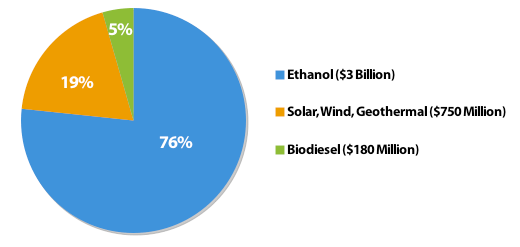As President-elect Barack Obama and the new Congress mull a bailout for ethanol makers, the industry absorbed two body blows this past week.
1) The Environmental Working Group released a study revealing the profound opportunity costs associated with our government’s generous support for ethanol.
The corn-based fuel grabs three-quarters of all federal renewable-energy tax credits, EWG reports. Ethanol gets more four times as much cheese as wind, solar, and geothermal combined. If you add in support for biodiesel, biofuels grab 80 percent — four dollars in five — of federal tax largesse to renewable fuels. In short, the dubious practice of turning corn and soy into liquid car fuel is crowding out other more energy-rich and sustainable energy sources.
2) A professor from Iowa State University — ground zero of ethanol fervor — has broken ranks and issued a scathing, cogent critique [PDF] of of the ethanol program. Here’s a juicy sample from the paper, by Dennis Keeney, emeritus professor, Department of Agronomy and Agriculture and Biosystems Engineering:
About 6.7% of the gasoline used in the U.S. will be displaced by ethanol in 2009, when corrected for the lower energy content of ethanol and assuming an annual gasoline consumption of 140 billion gallons. Assuming a net energy gain in the conversion of corn to ethanol of 1.25, there is a net energy displacement of approximately 2.8 billion gallons of gasoline, about a 2% net energy gain. If the energy in nonfuel byproducts (e.g. distillers grains, which are used for cattle feed) is removed from the equation, the net energy gain is close to nil. In other words, ethanol from corn will do nothing to boost net energy supplies.
Let’s put these two assessments together: We’re handing three-quarters of the resources we have for alternative fuels to one that delivers precisely … nothing. At a time of rapid climate change and mounting budget deficits.
Below, a few choice nuggets from the two papers.
From the EWG report:
By 2010, ethanol will cost taxpayers more than $5 billion a year — more than is spent on all U.S. Department of Agriculture conservation programs to protect soil, water and wildlife habitat.
This is scandalous. Ethanol subsidies promote the exapansion of industrial corn agriculture — an environmentally ruinous process. Conservation programs try to mitigate industrially ruinous agriculture — by, say, leaving buffer strips between chemical-drenched corn fields and streams, or taking marginal land out of production.
In other words, ethanol subsidies and conservation programs are directly at odds (strange, given that ethanol is sometimes sold as an "environmental solution.") It’s telling that government largesse flows more generously to ethanol than to conservation.
From the Keeney paper:
Had ethanol expansion been subject to environmental assessment guidelines and or life cycle analyses, the ethanol support policies, in my opinion, would never have been adopted. However, as I have stated, money, not science, has driven ethanol fuel policy.
This pretty much speaks for itself. I have to note that Keeney is an emeritus professor — i.e., retired and not dependent on the next Monsanto grant to fund his research. Would that his colleagues at land grant colleges across the country be as blunt about biofuel.



